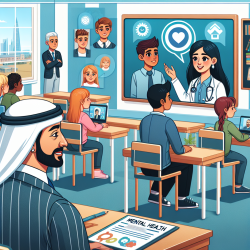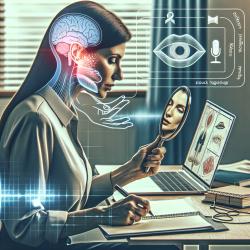Welcome to the digital era, where technology not only transforms the way we communicate but also how we address critical areas in our society, such as mental health and special education. Government health regulators play a pivotal role in shaping the policies that integrate these advancements into our communities, ensuring that the benefits of technological innovations reach those who need them most. This detailed exploration aims to inform and grow the knowledge of those at the helm of health regulation regarding the impact of online therapy services provided by companies like TinyEYE.
As we navigate the complexities of the modern world, the demand for mental health services in the special education sector has surged. Traditional in-person therapy, while effective, often struggles to meet this increasing need due to logistical challenges and resource limitations. Enter the realm of online therapy services – a solution that not only addresses these issues but also opens up a new frontier of possibilities for special education.
At the forefront of this digital revolution is TinyEYE, a provider of online therapy services that has been pioneering the way therapy is delivered to schools. Our mission is simple: to make high-quality therapy accessible to every child, regardless of their location or socioeconomic status. We believe that through the power of technology, we can bridge the gap between children with special needs and the vital mental health support they require.
Online therapy, also known as teletherapy or e-therapy, has shown to be a viable and effective alternative to traditional face-to-face sessions. A growing body of research supports the efficacy of online therapy, especially when it comes to reaching children in remote or underserved areas. For government health regulators, this presents an opportunity to rethink and reshape the framework within which special education and mental health services are provided.
The integration of online therapy services into special education programs can lead to numerous benefits. It allows for greater flexibility in scheduling, reducing the time children spend out of the classroom. It also enables access to a broader range of specialists, as geographical barriers are no longer a constraint. Furthermore, online therapy can be tailored to the individual needs of each child, providing personalized care that can adapt to their unique learning and developmental pace.
However, the successful implementation of online therapy services in schools hinges on the support and guidance of government health regulators. It is essential to establish a regulatory framework that not only ensures the quality and confidentiality of the services provided but also promotes their integration into existing special education programs. Regulators have the task of setting standards for online therapy providers, such as TinyEYE, to guarantee that they meet the same rigorous criteria as traditional therapy services.
Privacy and data protection are paramount in the realm of online therapy. As health regulators, it is critical to ensure that the digital platforms used for delivering therapy adhere to strict security protocols. This includes compliance with health information privacy laws and the implementation of robust cybersecurity measures to protect sensitive student data. By doing so, we can foster trust in online therapy services and reassure parents, educators, and students of their safety and reliability.
Another crucial aspect for regulators to consider is the accessibility of online therapy services. To truly make a difference, these services must be available to all children, including those from low-income families or rural areas. This may involve working with internet service providers to improve connectivity in underserved regions or providing subsidies to schools that lack the necessary technological infrastructure. By addressing these issues, government health regulators can play a vital role in democratizing access to mental health services in the special education sector.
It is also important to recognize the potential for online therapy services to complement existing in-person therapy programs. A hybrid model, where online and face-to-face sessions are used in conjunction, can optimize resources and provide a more comprehensive support system for children with special needs. Such an approach would allow for continuity of care and minimize disruptions, especially during times of crisis, such as the recent global pandemic.
In conclusion, as government health regulators, you are tasked with the noble endeavor of ensuring that every child has the opportunity to thrive. By embracing the potential of online therapy services like those offered by TinyEYE, you can help shape a future where mental health and special education are not just accessible, but also adaptable to the ever-changing needs of our society. It is through informed decision-making and the cultivation of a regulatory environment that supports innovation that we can truly enhance the lives of those with special needs.
The journey towards integrating online therapy services into special education is not without its challenges, but it is a path worth exploring. By fostering collaboration between technology providers, educators, and health professionals, we can build a system that is both effective and equitable. The time is ripe for government health regulators to lead the charge in this digital transformation, ensuring that mental health services are not a luxury but a right for every child.
At TinyEYE, we stand ready to support this endeavor and work alongside government bodies to bring about positive change. Together, we can ensure that the special education landscape is not only growing in knowledge but also in compassion and capability. Let us harness the power of technology to create a world where every child, regardless of their challenges, has access to the mental health support they need to succeed.










